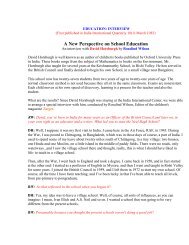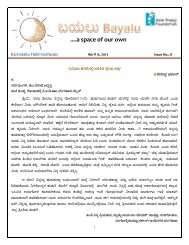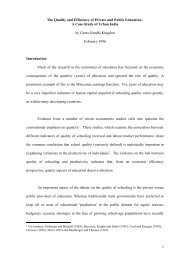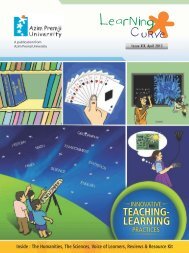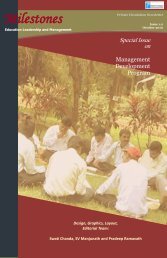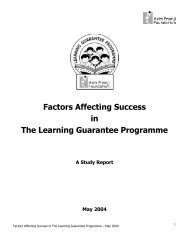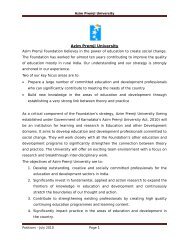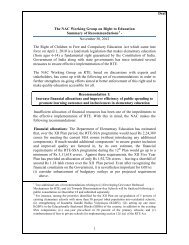Indesign Pagesnew.indd - Azim Premji Foundation
Indesign Pagesnew.indd - Azim Premji Foundation
Indesign Pagesnew.indd - Azim Premji Foundation
Create successful ePaper yourself
Turn your PDF publications into a flip-book with our unique Google optimized e-Paper software.
For instance, educational philosophy should be utilitarian in<br />
its purposes in which case it is important to focus on the<br />
application of the tenets of the philosophy.<br />
A combination of procedures is required to be used by<br />
the social science teacher such as a project method that<br />
highlights an activity-centered approach to learning, problem<br />
solving procedure wherein subject matter from diverse<br />
academic disciplines are used to fi nd solutions and so on;<br />
this in turn will lead to the development of skills among the<br />
students that are in tune with daily realities. Allan Janik in<br />
a paper titled ‘Future for the Humanities?’ presents how<br />
in the case of a gifted 40-year-old architect or engineer<br />
who is promoted to a management position, the promotion<br />
could be a source of deeply disturbing problems if there<br />
is no preparation for being a manager, which is largely a<br />
matter of coping with confl icts - and confl ict resolution is<br />
a skill imbibed through social science. The author rightly<br />
argues that in this case more technical knowledge would<br />
be superfl uous because it was the architect’s/engineer’s<br />
technical acumen that led to the ‘disastrous’ promotion in<br />
the fi rst place and it is only skill sets from social science<br />
that will contribute positively. He espouses the case for<br />
studying social science by saying humanities (which is only<br />
one part of social science) are vital to understanding the<br />
context in which knowledge is applied in society and thus to<br />
any serious approach to life-long learning. He describes lifelong<br />
learning as making serious re-adjustments to our very<br />
selves that mere technical knowledge cannot facilitate. The<br />
paper further elaborates how the fi nancial crisis of 2008 has<br />
shown that it is necessary to ‘re-adjust to drastic changes<br />
in our unquestioned assumptions about ourselves and the<br />
world……….and a part of making a successful transition<br />
under such arduous circumstances is understanding how our<br />
minds, our lives and our enterprises are always embedded<br />
in conditions not of our making that may unexpectedly<br />
shift in dramatically unforeseen ways’. Thereby he argues<br />
that humanities are crucial to obtaining perspectives on<br />
human life and activity which comes in handy during critical<br />
junctures and that society (especially politicians and policy<br />
makers) cannot afford to ignore it, the way we have seen in<br />
recent times, especially in the Indian context.<br />
It is also important for social science to position itself as a<br />
discipline that contributes to successful careers. Though the<br />
perception is changing in some urban centers of the country,<br />
the popular perception however is that not many desirable<br />
Section A<br />
The ‘Defi cient’ Status of Social Science in India– Reasons and Corrective Measures<br />
job options are open to students of social science. Hence, it<br />
is important to establish to the larger society the relevance<br />
of social science for the present.<br />
A project method that highlights an activitycentered<br />
approach to learning, ‘humanism’<br />
as a Philosophy of Education as advocated<br />
by Carl Rogers (1902-1985) whereby<br />
students identify questions to be answered,<br />
so that what is desired in learning comes<br />
from themselves and adopting a problem<br />
solving procedure wherein subject matter<br />
from diverse academic disciplines are used<br />
to fi nd solutions.<br />
In conclusion, one can state with authority that it is becoming<br />
increasingly clear that the relevance of social science is<br />
only rising as it is intrinsically linked to the formation of the<br />
Knowledge Economy and Society and the recent emerging<br />
trend of evidence-based politics. Governments are beginning<br />
to realize how social sciences can help in the management<br />
of societies and are increasingly depending on the social<br />
sciences to deal with particular problems they are now facing.<br />
For instance, modern governments run research projects<br />
and the fi ndings of these studies infl uence the design of<br />
government programs for combating various issues such as<br />
social discrimination, unemployment, urban violence and so<br />
on.<br />
In a decade old paper titled ‘Into the future with social<br />
sciences’ Jean-Eric Aubert, Directorate for Science,<br />
Technology and Industry of the Organization for Economic<br />
Co-operation and Development predicted that ‘perhaps in<br />
the information age and in the dematerialized economy of<br />
the knowledge world, society will discover a pressing need<br />
to know itself much better, if only to survive. Social sciences<br />
will then be very much in demand’. Today, even in the Indian<br />
context we can say that the trend is clearly towards elevating<br />
social science to a much higher level than what has been<br />
accorded till date. These changes are already visible in the<br />
urban centers and popular perceptions on the relevance of<br />
Pg No: 21



